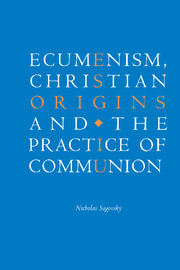Book contents
- Frontmatter
- Contents
- Acknowledgements
- List of abbreviations
- 1 The common life
- 2 Communion: Anglicans, Roman Catholics, and ecumenical consensus
- 3 Plato's vision
- 4 Aristotle's revisionism
- 5 Covenant and community
- 6 Little communities and the Catholic church
- 7 Cappadocian koinonia
- 8 Augustine and the story of communion
- 9 Ecumenism and the practice of communion
- Select biblography
- Index
7 - Cappadocian koinonia
Published online by Cambridge University Press: 22 September 2009
- Frontmatter
- Contents
- Acknowledgements
- List of abbreviations
- 1 The common life
- 2 Communion: Anglicans, Roman Catholics, and ecumenical consensus
- 3 Plato's vision
- 4 Aristotle's revisionism
- 5 Covenant and community
- 6 Little communities and the Catholic church
- 7 Cappadocian koinonia
- 8 Augustine and the story of communion
- 9 Ecumenism and the practice of communion
- Select biblography
- Index
Summary
MYSTICAL PARTICIPATION
The koinonia of the Christian Church, and of the Christian believer with God through Christ, is described in the New Testament by means of complementary and overlapping metaphors. One approach, which has proved of enormous significance for Eastern Orthodoxy in particular, is that suggested by the single use of koinonoi in the Petrine literature, that at 2 Peter 1:3–4:
His divine power has granted to us all things that pertain to life and godliness, through the knowledge of him who called us to his own glory and excellence, by which he has granted to us his precious and very great promises, that through these you may escape from the corruption that is in the world because of passion, and become partakers of the divine nature (theias koinonoi phuseos).
There is no other place in the New Testament where the ground and goal of the spiritual life is put quite like this, but the Eastern Christian tradition in particular has made a great deal of ‘participation in the divine nature’. A. M. Allchin, an Anglican writer much indebted to Eastern spirituality, sees the teaching of 2 Peter 1:4, though philosophical in expression, as very much in line with that elsewhere in the New Testament: ‘Throughout the New Testament a coinherence of human and divine is implied, a relationship of union and communion which overthrows our customary ways of thinking both of God and humankind, and opens the way towards the wonder of our adoption into the circulation of the divine life.’ Vladimir Lossky, discussing this text, stresses the paradoxical nature of this co-inherence. His presupposition is the absolute incommunicability of the divine being, yet the absolute reality of participation in the divine nature.
- Type
- Chapter
- Information
- Ecumenism, Christian Origins and the Practice of Communion , pp. 146 - 170Publisher: Cambridge University PressPrint publication year: 2000



